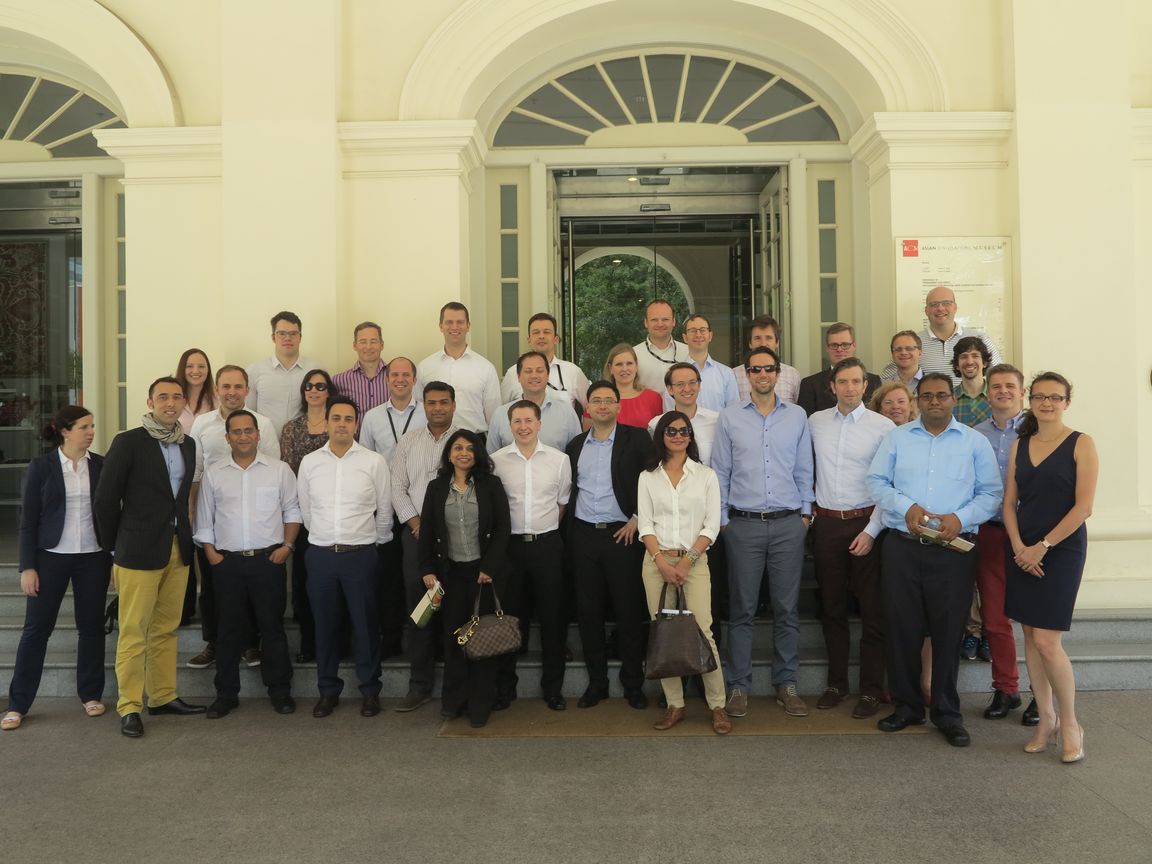The Curriculum
You are here: Programs & Courses » Executive MBA Programs for Senior Managers and Executives » Mannheim Executive MBA (Part-Time) » The Curriculum
Well-Founded and Practice-Oriented
Diversity is a key aspect of everything we do at Mannheim Business School. And the curricula are naturally no exception. The challenges awaiting participants are therefore as diverse as they are exciting. No day is like another in the Executive MBA program. The numerous different program elements make sure of that. Yet they all have one thing in common: They are well-founded, practice-oriented and tailored to the needs of experienced executives both in terms of methodology and content.
Core Courses
Economic Analysis for Business
The course gives an introduction to basic economic concepts and models that govern the economic environment in which businesses work (markets where firms retrieve their input and sell their output but also the national and international macroeconomic conditions). Participants are taught to analyze the environment and identify important economic factors influencing performance and behavior of firms and industries: An essential skill for managers to anticipate threats, avoid mistakes and realize opportunities.
Decision Analysis
Oftentimes, decisions have to be made in the context of multiple competing objectives and substantial uncertainties. Decision analysis has its roots in economic rational decision making theory and mathematical models about uncertainty and risk. However, judgement has been shown to be subjective and prone to behavioral biases and fallacies leading to research fields such as behavioral economics. This course discusses various concepts and enables participants to make better-grounded decisions.
Organizational Behavior & Leadership
Modern companies need managers capable of understanding and leading interactions between individuals, their teams and company culture. This course familiarizes with behavioral aspects of management including individual processes such as personality and motivation, team management and organizational issues, and leadership aspects. Main objectives are to develop diagnostic and analytical skills as well as improve inter-personal and leadership skills.
Team Management
As there has been a virtual explosion of knowledge leading to a strongly increasing complexity of processes, products and services, companies rely more and more on cross-functional and interdisciplinary teams. These teams potentially get more and better work done. Nevertheless, teams often fail to make full use of their synergistic potential. This course develops a theoretical understanding and delivers practical knowledge on how to lead teams and make use of their full potential.
Strategic Leadership
Today's top managers face a number of strategic leadership challenges such as organization restructuring and design, handling top management and board dynamics, and coping with burn out. This course aims at enabling participants to better understand the nature and dynamics of strategic leadership and at familiarizing them with techniques and principles of organization design as well as the reality of governance application.
Financial Accounting
The course aims at familiarizing the participants with the framework and basic concepts of financial accounting according to International Financial Reporting Standards (IFRS). This course extends to financial accounting and reporting from a leadership perspective. It enables the participants to understand the link between external reporting and internal decision-making.
Managerial Accounting
Managerial accounting provides information and control necessary for an organization's long-term competitive success. This class introduces terminology and concepts of managerial accounting including the use of cost information for decision making and management control systems. It teaches how to choose the relevant cost based information, use cost management methods and apply performance measurement systems.
Corporate Finance
Corporate finance is concerned with the capital structure of corporations, its objective being the increase of shareholder value. This course introduces terminology and fundamental drivers of value creation and modern financial management. It allows the participants to assess an investment proposal and critically analyze reports and recommendations by corporate finance consultants.
Marketing Management
In increasingly competitive and integrated markets, the role of marketing in a firm is changing and gaining more and more importance. By introducing fundamental marketing tools and concepts as well as presenting principal issues concerning the implementation of a marketing strategy, participants gain an understanding of how to effectively apply marketing concepts. The relationships between company, competitors and customers and the realm of the strategic setting that the company is operating in provide the framework for analysis.
Strategic Management
The fundamental question of strategy is how firms can gain and sustain competitive advantage in times of innovation, uncertainty and changing industry and firm boundaries. The course aims at enhancing the ability to define and analyze strategic problems and to identify sources of competitive advantage. It introduces various tools, concepts and analytical frameworks necessary for integrating a variety of perspectives and thus developing skills in strategic management which is increasingly critical for a wide range of positions.
Operations & Supply Chain Management
Operations management is about analyzing, controlling and improving processes related to the company's product. During production, goods and services go through interrelated operations or processes. Supply chain management is concerned with all processes leading to satisfy customer demand. Managing interrelated product, financial and information flows typically include multiple players with their own objectives. Concepts and methods of operations and supply chain management are introduced to understand the increasing importance and appreciation of management decisions in this field.
Business Ethics
In today's private sector and public organizations, managers face a number of ethical issues and need to develop ethical competencies to work through these issues. This course gives theoretical and practical insights about ethics and leadership developing personal and professional awareness about individual and collective responsibility. As main objective, participants will be able to understand the meaning and relevance of ethics and how to effectively embed responsible practice within a company.
Study Trips
Hands-on Globalization
Expanding your horizons and personal networks, and learning more about the business cultures in the most important economic centers around the world: Study Trips offer all this and more. The program features two five-day stays in North America and Asia. The aim of these trips is for participants to learn as much as possible about the special features and success factors in each of the regions. Courses, guest lectures, visits to companies and cultural events help make that a reality.
Social Class Project
Taking Responsibility
Responsibility is one of the core values of Mannheim Business School. And it is not just a topic for the classroom, but a commitment to action. The best example of this is the Social Class Project, which is an integral part of the Mannheim Executive MBA curriculum. Every graduating class independently plans and implements its own group project in the Rhine-Neckar Metropolitan Region, organizing everything itself and directly applying its management skills to the task. The list of previous social projects is impressive and demonstrates that they not only help define the identity of our participant groups, but also symbolize our commitment to taking responsibility for the society.
Strategic Project
From the Idea to the Solution
The Strategic Project is undeniably the crowning moment of the Executive MBA adventure. The project offers participants the unique opportunity to develop a solution for a complex business issue in a small group, using all of their experience and newly gained knowledge as well as their methodological skills. Participants can choose between a real-life challenge within a company and a completely new business idea. Interdisciplinary work is an indispensable element of the project. Naturally, participants are assisted during the project by experts from the faculty and the corporate world.
Contact Person









